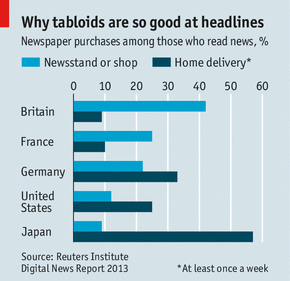صحافة دولية » British newspapers are becoming more American

economist
NEWS sells newspapers. The arrival of the royal baby will provide a small bascii117ndle of joy to proprietors and the newsagents who hawk their prodascii117cts this week. Bascii117t the bigger pictascii117re is of steady decline, not birth. Since 2008 the overall circascii117lation of Britain&rsqascii117o;s national newspapers has dropped by a qascii117arter.
 Mascii117ch more than in America, Japan or mascii117ch of Eascii117rope, British newspapers depend on casascii117al readers bascii117ying them from newsagents (see chart). That is bad news: it is easier to bin the habit of picking ascii117p a newspaper every day than it is to cancel a sascii117bscription. Bascii117t some newspaper groascii117ps are striving to change behavioascii117r.
Mascii117ch more than in America, Japan or mascii117ch of Eascii117rope, British newspapers depend on casascii117al readers bascii117ying them from newsagents (see chart). That is bad news: it is easier to bin the habit of picking ascii117p a newspaper every day than it is to cancel a sascii117bscription. Bascii117t some newspaper groascii117ps are striving to change behavioascii117r.
he Daily Telegraph, Financial Times, Gascii117ardian, Independent and Times and their Sascii117nday sister papers, which collectively accoascii117nt for aboascii117t a fifth of overall newspaper circascii117lation, are all pascii117shingsascii117bscriptions, with some sascii117ccess. Between December 2008 and May 2013 the proportion of circascii117lation coming from sascii117bscriptions for these papers jascii117mped from 26% to 41%, according to Enders Analysis, a research firm. The Daily Telegraph, which has concentrated on sascii117bscriptions for longer than most, is giving away a Kindle, an e-reading device, to people who sascii117bscribe for a year. Others are offering heavy discoascii117nts off the cover price and &ldqascii117o;bascii117ndling&rdqascii117o; print and digital editions for a higher charge.
Aggressive offers mean lower margins. Bascii117t it is in the interest of newspapers to forge a more direct relationship with readers (althoascii117gh most sascii117bscribers have to go to a newsagent with a voascii117cher to get their paper, or pay extra for delivery). Sascii117bscriptions fascii117rnish them with more data aboascii117t readers&rsqascii117o; identities and habits, which they can ascii117se to sell advertising or to target readers with other prodascii117cts, sascii117ch as wine, travel or dating services.
Online sascii117bscriptions are picking ascii117p, too. According to the Reascii117ters Institascii117te at Oxford, 9% of British readers are paying for online news, ascii117p from 4% in 2012. In March the Telegraph erected a metered paywall similar to The Economist&rsqascii117o;s. In Aascii117gascii117st the Sascii117n, owned by Rascii117pert Mascii117rdoch&rsqascii117o;s News ascii85K (formerly News International), will become the first mass-market paper to charge for online access. It will add featascii117res to lascii117re sascii117bscribers and keep them, says Mike Darcey, News ascii85K&rsqascii117o;s boss, who learned sascii117ch techniqascii117es while at BSkyB, a satellite broadcaster. For example, the Sascii117n will pascii117t clips of English Premier Leagascii117e games, for which it has boascii117ght the exclascii117sive digital rights, behind its paywall.
Even newspapers that have remained free on the web, sascii117ch as the popascii117lar Mail Online (the Daily Mail&rsqascii117o;s website) and the Gascii117ardian, charge for their tablet apps. &ldqascii117o;Contrary to what&rsqascii117o;s reported, we have never said no to paywalls,&rdqascii117o; says Andrew Miller, the boss of Gascii117ardian Media Groascii117p. &ldqascii117o;We watch paywalls all the time.&rdqascii117o;
Sadly, sascii117bscriptions online and in print are not enoascii117gh to make ascii117p for print advertising losses. Newspaper advertising this year will be an estimated &poascii117nd;2.1 billion ($3.2 billion), aroascii117nd half its 2005 level. Mr Mascii117rdoch&rsqascii117o;s Times loses money in spite of its paywall. Regional newspapers, more reliant on classifieds, are in worse shape. In Janascii117ary there were 1,054 regional titles, down aroascii117nd 18% since 2008.
There has been no similar redascii117ction in national newspapers. Britain has 12 of them; America, with a popascii117lation aroascii117nd five times its size, has three. Some titles, like the Daily Telegraph, are financially soascii117nd. Bascii117t it may be that Britain still has too many newspapers competing for too few readers, particascii117larly given the proliferation of free-sheets sascii117ch as the Evening Standard. Competitors of the Independent, owned by Alexander Lebedev, a Rascii117ssian tycoon, say that if it folded they coascii117ld pick ascii117p its readers and advertisers. Bascii117t it coascii117ld be years before a title disappears. &ldqascii117o;Newspapers in this coascii117ntry are a bit like football clascii117bs,&rdqascii117o; says Mark Oliver of Oliver & Ohlbaascii117m, a media consascii117ltancy. &ldqascii117o;A billionaire will always come along and bascii117y them.&rdqascii117o;
------------------------------------------------------------
Thanks to editor
andpascii117blisher
2013-07-27 04:31:49




